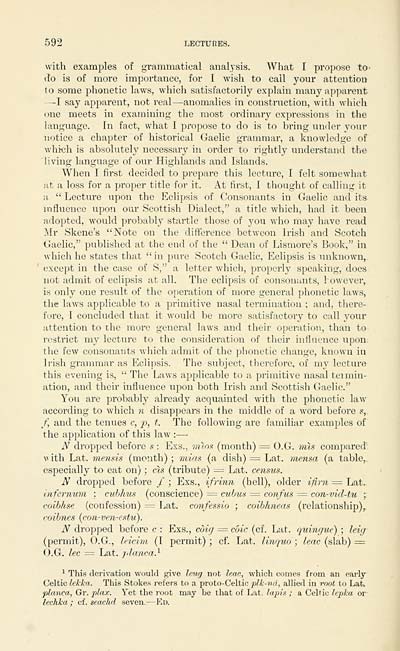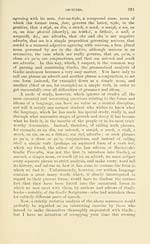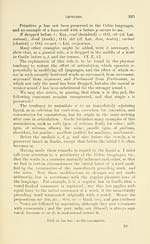Ossian Collection > Reliquiae Celticae > Volume 2
(606)
Download files
Complete book:
Individual page:
Thumbnail gallery: Grid view | List view

592 LECTURES.
with examples of grammatical analysis. What I propose tO'
do is of more importance, for I wish to call your attention
to some phonetic laws, which satisfactorily explain many apparent
— I say apparent, not real — anomalies in construction, with which
one meets in examining the most ordinary expressions in the
language. In fact, what I propose to do is to bring under your
notice a chapter of historical Gaelic grammar, a knowledge of
whi«h is absolutely necessary in order to rightly understand the
living language of our Highlands and Islands.
When I first decided to prepare this lecture, I felt somewhat
at a loss for a proper title for it. At first, I thought of calling it
a " Lecture upon the Eclipsis of Consonants in Gaelic and its
mfluence upon our Scottish Dialect," a title which, had it been
adopted, would probably startle those of you who may have read
Mr Skene's "Note on the difference betweon Irish and Scotch
Gaelic," published at the end of the " Dean of Lismore's Book," in
which he states that "in pure Scotch Gaelic, Eclipsis is unknown,
except in the case of S," a letter which, properly speaking, does
not admit of eclipsis at all. The eclipsis of consonants, howevei-,
is only one result of the or)eration of more general phonetic laws,
the laws applicable to a primitive nasal termination ; and, there-
fore, I concluded that it would be more satisfactory to call your
attention to the more general laws and their operation, than to
restrict my lecture to the consideration of their influence upon,
the few consonants which admit of the phonetic change, known in
Irish grammar as Eclipsis. The subject, therefore, of my lecture
this evening is, " The Laws ap[)licable to a primitive nasal teimin-
ation, and their influence upon both Irish and Scottish Gaelic."
You are probably already acquainted with the phonetic law
according to which n disappears in the middle of a word before .«,
/; and the tenues c, p, t. The following are familiar examples of
the application of this law : —
N dropped before .s : Exs., vùnx (month) = O.G. mis compared
\vith Lat. mends (month); mias (a dish) = Lat. mensa (a table,
especially to eat on) ; cis (tribute) = Lat. census.
N dropped before / ; Exs., ifrinn (hell), older iftrn = Lat.
infernum : cuhhus (conscience) = cubus = confus = con-vid-tu ;
coibhse (confession) = Lat. confessio ; coibhneas (relationship),.
roibnes {con-ven-estu).
N dropped before c : Exs., còig = cuic (cf. Lat. quingue) ; leig
(permit), O.G., leicim (I permit) ; cf. Lat. linquo ; leac (slab) =
O.G. lee = Lat. f'lancaJ
^ This derivation would give leug not leac, which comes from an early
Celtic lekka. This Stokes refers to a proto-Celtic plk-mi, allied in root to Lab.
planca, Gr. plax. Yet the root may be that of Lat. lapis ; a Celtic lepka or-
lechka ; cf. seackd seven. — Ed.
with examples of grammatical analysis. What I propose tO'
do is of more importance, for I wish to call your attention
to some phonetic laws, which satisfactorily explain many apparent
— I say apparent, not real — anomalies in construction, with which
one meets in examining the most ordinary expressions in the
language. In fact, what I propose to do is to bring under your
notice a chapter of historical Gaelic grammar, a knowledge of
whi«h is absolutely necessary in order to rightly understand the
living language of our Highlands and Islands.
When I first decided to prepare this lecture, I felt somewhat
at a loss for a proper title for it. At first, I thought of calling it
a " Lecture upon the Eclipsis of Consonants in Gaelic and its
mfluence upon our Scottish Dialect," a title which, had it been
adopted, would probably startle those of you who may have read
Mr Skene's "Note on the difference betweon Irish and Scotch
Gaelic," published at the end of the " Dean of Lismore's Book," in
which he states that "in pure Scotch Gaelic, Eclipsis is unknown,
except in the case of S," a letter which, properly speaking, does
not admit of eclipsis at all. The eclipsis of consonants, howevei-,
is only one result of the or)eration of more general phonetic laws,
the laws applicable to a primitive nasal termination ; and, there-
fore, I concluded that it would be more satisfactory to call your
attention to the more general laws and their operation, than to
restrict my lecture to the consideration of their influence upon,
the few consonants which admit of the phonetic change, known in
Irish grammar as Eclipsis. The subject, therefore, of my lecture
this evening is, " The Laws ap[)licable to a primitive nasal teimin-
ation, and their influence upon both Irish and Scottish Gaelic."
You are probably already acquainted with the phonetic law
according to which n disappears in the middle of a word before .«,
/; and the tenues c, p, t. The following are familiar examples of
the application of this law : —
N dropped before .s : Exs., vùnx (month) = O.G. mis compared
\vith Lat. mends (month); mias (a dish) = Lat. mensa (a table,
especially to eat on) ; cis (tribute) = Lat. census.
N dropped before / ; Exs., ifrinn (hell), older iftrn = Lat.
infernum : cuhhus (conscience) = cubus = confus = con-vid-tu ;
coibhse (confession) = Lat. confessio ; coibhneas (relationship),.
roibnes {con-ven-estu).
N dropped before c : Exs., còig = cuic (cf. Lat. quingue) ; leig
(permit), O.G., leicim (I permit) ; cf. Lat. linquo ; leac (slab) =
O.G. lee = Lat. f'lancaJ
^ This derivation would give leug not leac, which comes from an early
Celtic lekka. This Stokes refers to a proto-Celtic plk-mi, allied in root to Lab.
planca, Gr. plax. Yet the root may be that of Lat. lapis ; a Celtic lepka or-
lechka ; cf. seackd seven. — Ed.
Set display mode to: Large image | Transcription
Images and transcriptions on this page, including medium image downloads, may be used under the Creative Commons Attribution 4.0 International Licence unless otherwise stated. ![]()
| Early Gaelic Book Collections > Ossian Collection > Reliquiae Celticae > Volume 2 > (606) |
|---|
| Permanent URL | https://digital.nls.uk/81694058 |
|---|
| Description | Vol. II. |
|---|---|
| Shelfmark | Oss.288 |
| Attribution and copyright: |
|
| Description | Selected books from the Ossian Collection of 327 volumes, originally assembled by J. Norman Methven of Perth. Different editions and translations of James MacPherson's epic poem 'Ossian', some with a map of the 'Kingdom of Connor'. Also secondary material relating to Ossianic poetry and the Ossian controversy. |
|---|
| Description | Selected items from five 'Special and Named Printed Collections'. Includes books in Gaelic and other Celtic languages, works about the Gaels, their languages, literature, culture and history. |
|---|

